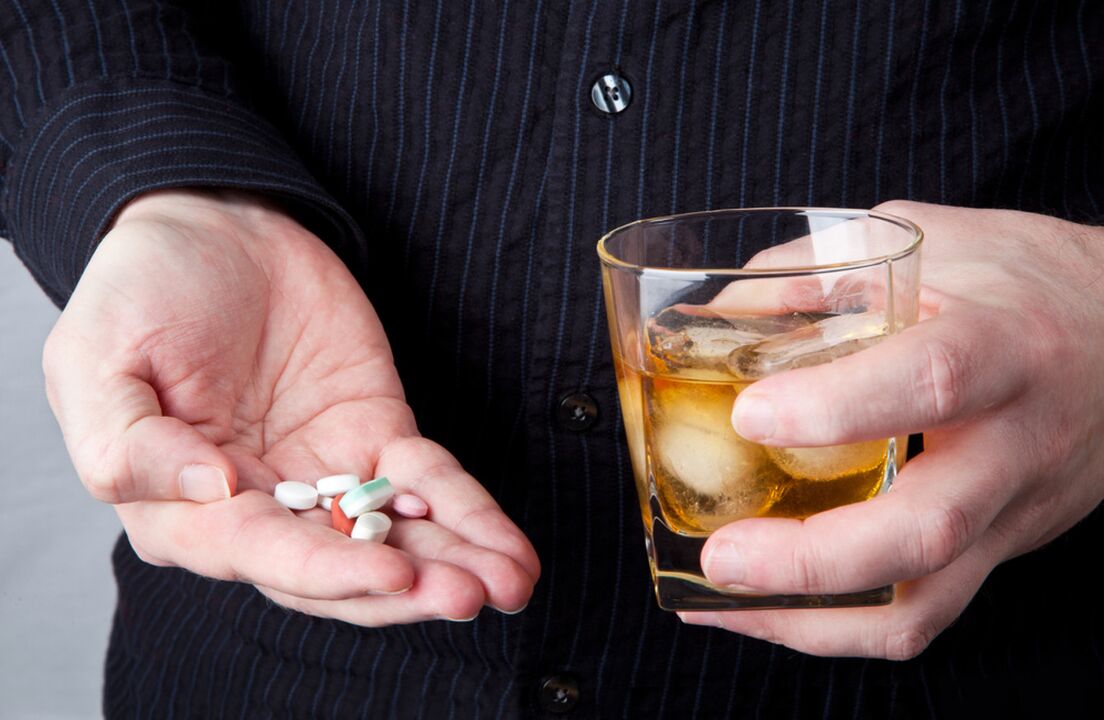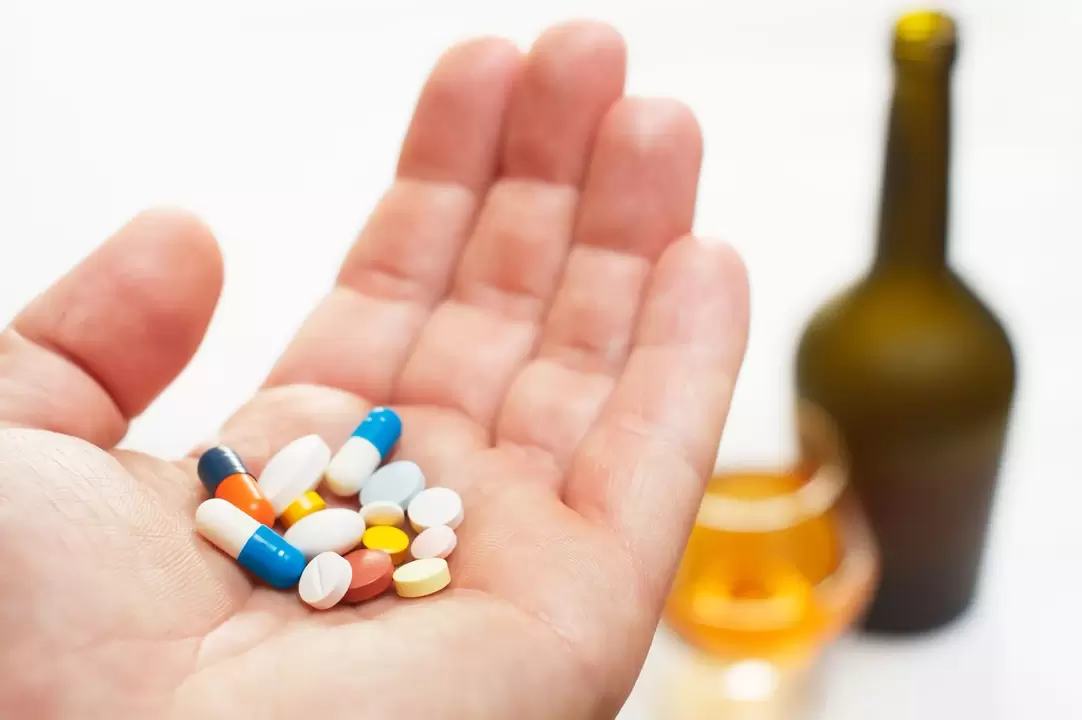Alcohol is a strong poison for body cells, and its use immediately after antibiotic treatment is dangerous to human health.The degree of drug effect on internal organs and the nervous system depends on the pharmaceutical group of antibacterial drugs.These medicines can cure diseases that killed entire cities centuries ago, and now they are available to everyone.If you have to drink vodka or beer after taking antibiotics, you need to know about adverse reactions.
What is an antibiotic?
Antibiotics are substances of microbial origin, synthetic or semi-synthetic that help suppress the growth and reproduction of pathogenic microorganisms or cause their death.For the first time in 1928, a scientist made the most important discovery in the history of medicine.He discovered that the common mold that appears on bread suppresses the growth of harmful bacteria.Penicillin was the first antibiotic.
These substances only affect infections and diseases caused by bacteria, and they are not effective against viruses.Antibiotics are used as medicines, which suppress the growth and development of harmful microorganisms, but cannot harm healthy cells of macroorganisms.They are produced in the form of tablets, capsules, syrups and solutions for intramuscular and intravenous administration.
During World War II, a woman scientist discovered the existence of penicillin in 1942. This fact became a breakthrough in military medicine in those years.In the field, a large number of soldiers received battle wounds and later died of purulent-septic complications.The discovery of antibiotics saved many lives and contributed to their rapid reinstatement into the ranks of the military.
Is it possible to drink alcohol after antibiotics?
Every expert can say with confidence that abstaining from drinking alcohol will help avoid various complications.This disease can weaken a person's immune system, and alcohol after a course of antibiotics has a bad effect on internal organs.Doctors recommend drinking alcohol no earlier than 3-5 days after the last drug, and if they act for a long time, then abstinence should be extended to 3-4 weeks.

Antibiotics are incompatible with alcohol
There are a large number of groups of antibacterial agents that cannot be combined with any alcohol.These drugs include:
- Nitroimidazoles have a high risk of developing disulfiram-like reactions (drinking alcohol is possible only after 2 days).
- Fluoroquinolones, when combined with alcohol, depress the nervous system until the development of coma;Alcohol is allowed only after 36 hours.
- Cephalosporins, when interacting with ethyl alcohol, give a disulfiram-like reaction;Alcohol can be taken after 24 hours (in case of kidney disease, a longer interval).
- Tetracyclines damage liver cells (hepatotoxic) and are removed from the body for a very long time;Drink alcohol no earlier than after 3 days.
- Aminoglycosides are oto- and nephrotoxic, increasing the side effects of the drug;Alcohol is allowed to be taken earlier than after 2 weeks.
- Lincosamides affect the central nervous system and liver, causing a disulfiram reaction, alcohol is allowed only after 4 days.
- Macrolides cause liver cirrhosis, especially erythromycin.It is eliminated from the body very slowly, say drinking alcoholic beverages only after 4 days.
- Anti-tuberculosis drugs cause the development of drug-induced hepatitis with a fulminant course;Any alcohol is strictly prohibited.
How long do antibiotics last after you stop taking them?
Scientists claim that the active ingredients of antibiotics remain in the body for at least 3 days.There are drugs with prolonged (long-term) action;They are eliminated only after 2-3 weeks.Consulting with your doctor can help prevent side effects.It is important to pay attention to the following parameters before you start drinking alcohol after taking antibiotics:
- duration of treatment with medication;
- its compatibility with ethyl alcohol;
- time after alcohol is allowed after taking the last dose.

What happens if you mix it with alcohol?
Drinking alcohol while taking antibiotics can lead to serious irreversible consequences.The main negative reactions of this combination include:
- Increases the resistance of pathogenic microflora.Antibacterial drugs are prescribed to destroy pathogenic microorganisms in the human body.Alcohol weakens the effect of these drugs, and at this time the bacteria adapt and adapt to the active ingredients, increasing their resistance to this group of antibiotics.
- The transition from acute to chronic form of the disease.Alcohol can accelerate the metabolism of active substances, while drugs degrade faster and do not have time to act on the source of inflammation.To do this, the doctor prescribes a dose of two antibiotics, the burden on the body increases, and the disease takes longer and is more difficult to treat.
- Increased blood viscosity when combining alcohol and antibiotics can lead to the development of a stroke or myocardial infarction, as well as problems in the functioning of the heart and blood vessels.
- A decrease in drug concentration is caused by the use of alcoholic beverages.At the same time, the dose of antibacterial drugs is increased by the doctor, and with such a load, the liver and kidneys work to wear and tear.Acute failure of these organs may develop.
- Liver dysfunction.Ethyl alcohol and antibiotics are broken down by the same liver enzymes.Under such influence, the production of these substances can stop altogether, which will lead to severe intoxication and inhibition of organ function.
- Risk of developing a severe allergic reaction.The human body may react inadequately to complex effects.Anaphylactic shock or Quincke's edema with fatal results is an irreversible result of the interaction of alcohol with antibiotics.
- A particular danger is a disulfiram-like reaction, which occurs due to the accumulation of acetaldehyde (an intermediate metabolite of ethyl) in tissues and organs;It acts as a powerful nootropic on the central nervous system.Its elimination is disrupted and, against this background, severe intoxication occurs, accompanied by: nausea, vomiting, palpitations, sweating, fever, drop in blood pressure, abdominal pain, dizziness and convulsions.
When can you drink alcohol after antibiotics?
There are some antibacterial drugs that you can take with alcohol.Well, this does not mean that you can wash down each tablet with a glass of vodka.If possible, it is better to give up alcohol altogether.Drugs compatible with ethanol include:
- Penicillin (has a broad spectrum of action).
- Antifungal antibiotics.
- Glycopeptides.
- Ansamycins.
- Heliomycin (treats ENT organ diseases and infectious dermatitis).
Although taking this combination together is allowed, one should not forget about the possible individual reactions of the body, which can cause serious harm to health.It is advisable to start drinking alcohol after antibiotics at least 3 days after the last dose is taken.To avoid adverse reactions, you need to consult a specialist.
Admission rules
Following the correct intake of antibiotics will help cure the disease faster without the risk of adverse reactions.Basic Rules:
- Take medicines only as prescribed by the doctor (self-medication is dangerous to health);
- Make sure you follow the right dose and time to take antibiotics;
- The duration of treatment with the drug will be determined by the doctor.On average, this is from 5 to 15 days, and taking long-acting drugs is from 1 to 4 days;
- You need to take the tablets with clean non-carbonated water, chamomile decoctions, or hot tea without sugar;
- During treatment with antibiotics, it is better to avoid eating fatty foods, which slow down the absorption of active substances from the intestine into the blood.Be sure to consume animal protein in the form of chicken, rabbit or turkey.Limit the amount of fast carbohydrates;
- Absolute contraindications: Alcohol after antibiotics, if less than 3 days have passed.
























